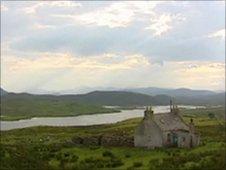Crofting Reform Bill passed amid row
- Published

The bill is aimed at charting a future for crofting
MSPs have passed reforms to Scotland's historic crofting industry, amid a row which saw parliament suspended.
As MSPs finalised the Crofting Reform Bill, Holyrood descended into chaos over final changes to the legislation.
Deputy Presiding Officer Trish Godman did not hear Environment Minister Roseanna Cunningham's objection to a Labour amendment.
Proceedings were suspended for five minutes to try to resolve the issue, although the legislation was passed.
The bill, backed by MSPs by 66 votes to 0, with 59 abstentions, aims to clamp down on absenteeism and neglect by requiring crofters, whether owner-occupiers or tenants, to occupy and work the land.
Ministers say there are almost 2,000 absentee crofters and an unknown number of neglected crofts out of the 18,000 across the Highlands and Islands.
The row came as parliament considered an amendment from Labour MSP Peter Peacock to increase scrutiny of a new crofting register.
Ms Godman asked if Holyrood agreed the amendment and did not hear anyone say "No", but Ms Cunningham said one of the parliament clerks heard her objection.
MSPs shouted at each other across the chamber, and Ms Godman insisted she "genuinely" had not heard any objections, telling MSPs: "I didn't hear and I intend to move on."
Ms Godman was visibly upset amid Labour claims she was being bullied by the SNP into going back to the issue, although she later made it clear she felt this was not the case.
The Scottish Parliament later set out why the deputy presiding officer refused to go back and take a vote on Mr Peacock's amendment.
A spokesman said: "The rule of progress states that amendments must be taken and disposed of strictly in order.
"After the parliament has moved on to consider the next amendment, it cannot go back again."
He said the rule was adhered to during the debate.
As well as measures aimed at tackling absenteeism, the bill also creates a map-based register of crofts, which was opposed by Labour and the Lib Dems, who described it as "bureaucratic and costly".